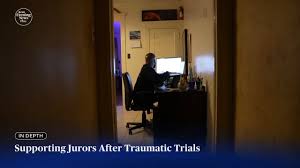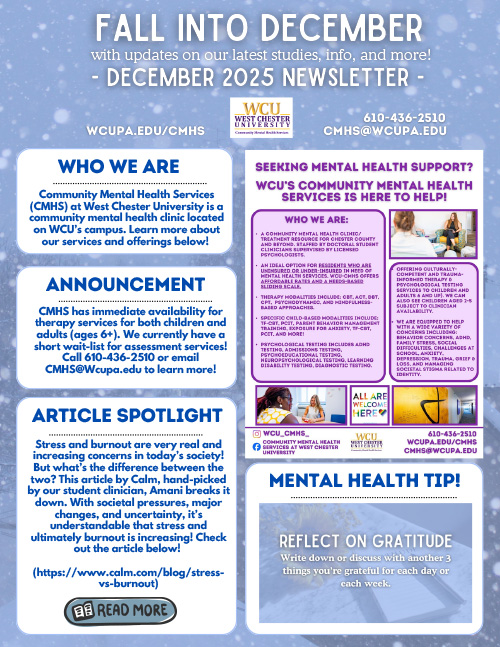
Welcome to West Chester University’s Community Mental Health Services
Affordable, Compassionate Mental Health Care for Our Community
At Community Mental Health Services (CMHS), we believe everyone deserves access to high-quality mental health care—regardless of income, insurance status, or background. We are a community-based training clinic that provides low-cost therapy and psychological assessment services to children, teens, adults, and families. Therapy services are offered both in person and via telehealth.
Our clinic is staffed by advanced doctoral students in clinical psychology and master’s students in mental health counseling who are carefully supervised by experienced, licensed psychologists and licensed professional counselors. This means you receive thoughtful, evidence-based care that’s grounded in the latest research—at a fraction of the cost of private therapy.
We serve children (ages 6+), teens, adults and families. Whether you’re facing anxiety, depression, trauma, or just feeling stuck, we’re here to help.
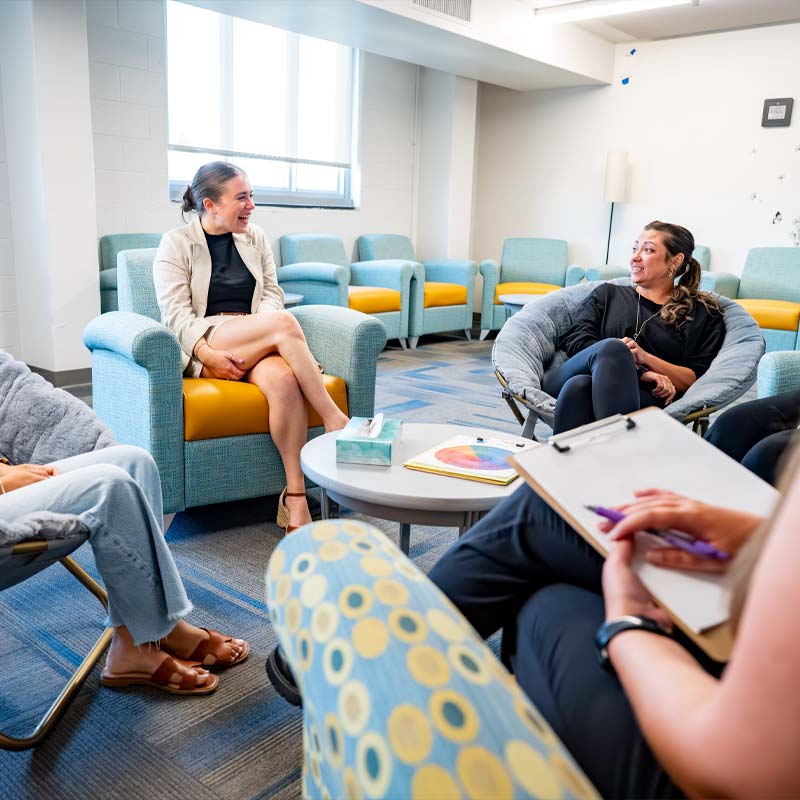
Our Mission and Values
At Community Mental Health Services, we believe that mental health care should be:
- Affordable/Accessible
- Inclusive
- Compassionate
- Empowering
Our Approach
- We listen with respect and compassion
- We check in about your comfort and readiness
- We offer tools for grounding, emotional regulation, and building trust
- We recognize the impact of race, gender, culture, and identity on mental health
What to Expect
- Contact us via phone, email, or complete the online form
- Our clinic staff will schedule a brief phone consultation.
- We’ll match you with a student therapist who fits your needs.
- You’ll meet with your student therapist for an Intake Session to get you started.
Whether you're seeking support for yourself or a loved one, reaching out is the first step toward healing. We're honored to walk that journey with you.
A safe, supportive place to be heard and grow.

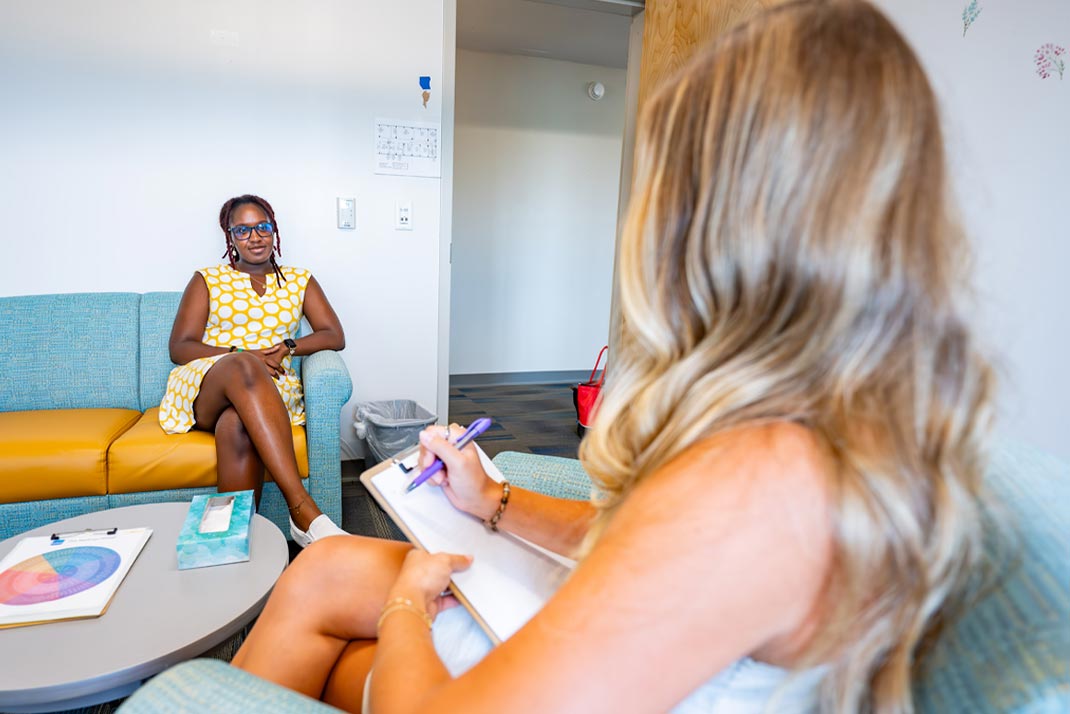
Why Choose a Training Clinic?
You may be wondering what it’s like to work with a student therapist. Here’s what you can expect:
- Dedicated, compassionate care from therapists who are deeply committed to helping others
- Evidence-based treatments tailored to your specific concerns
- Close supervision by licensed psychologists ensures quality and accountability
- Time and attention: student therapists often have more availability to deeply understand and support your needs
Fees and Accessibility
Affordable and Accessible
We don’t accept insurance, and this helps keep costs low. If cost is still a barrier to care, we offer a sliding scale based on your income and ability to pay. Our mission is to reduce financial barriers
and help you get the care you need.
- Therapy Fees
- Standard fees: $75 for intakes and $40 per session
- Assessment Fees
- Assessments typically fall between $400 and $1000 depending on the type of assessment.
- Sliding scale rates are available if our standards fees are beyond your budget. Ask us about a fee reduction.
- Flexible scheduling options, including Monday and Tuesday evenings
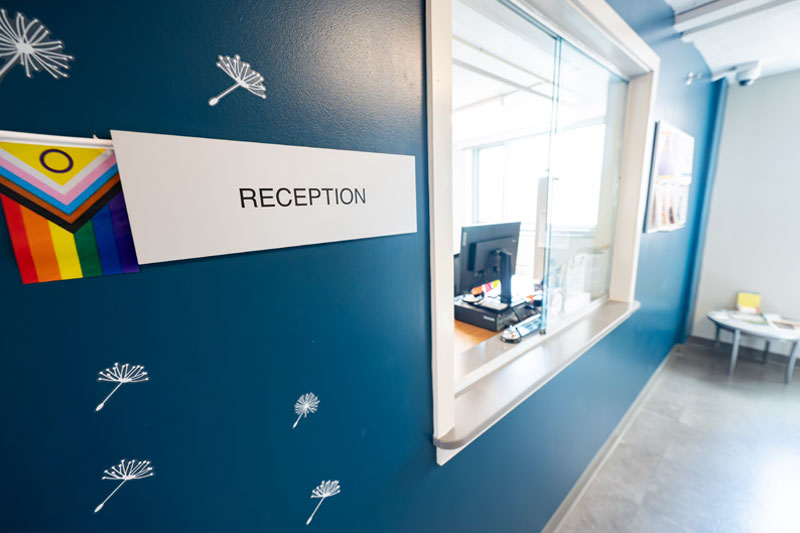
CMHS in the News
Location & Hours
Location:
We are located on the campus of West Chester University and have dedicated parking right in front of our building:
Community Mental Health Services
8th Floor Wayne Hall
125 West Rosedale Avenue
West Chester, PA 19383
Hours:
Monday: 12:00pm - 7:00pm
Tuesday: 12:00pm - 7:00pm
Wednesday: 8:00am - 12:00pm
Thursday: 8:00am - 4:00pm
Friday: CLOSED
Limited availability outside of clinic hours
Clinic Closures 2026
Spring Break: 3/9/26-3/15/26
Summer 2026
Summer I closure: 5/9/26-5/23/26; clinic opens 5/26/26
Memorial Day: 5/25/26
Juneteenth: 6/19/26
Summer II closure:6/27/26-7/11/26
Summer III closure: 8/8/26-8/22/26
Fall Semester 2026
Labor Day: 9/7/26
Fall Break: 10/12/26-10/13/26
Thanksgiving Break: 11/25/26-11/29/26
26/27 Holiday Break: 12/19/26-1/3/27
Clinic opens: 1/4/27
To schedule an appointment or for more information please call our office at 610-436-2510 or email us at cmhs@wcupa.edu
FAQs
What to Expect in Therapy (For Adult Clients)
What is therapy, really?
Therapy is a safe, supportive space to talk about what’s going on in your life — whether you’re feeling overwhelmed, stuck, sad, anxious, or just unsure of your next steps. It’s a collaborative process where you and your therapist work together to better understand your thoughts, feelings, and behaviors, and find healthier ways to cope or grow.
Who will I be talking to?
You’ll be matched with a graduate student in clinical psychology or mental health counseling who is in advanced training. These students are supervised weekly by licensed psychologists and licensed professional counselors. This ensures high-quality, ethical, and thoughtful care. Many clients find that student therapists offer a compassionate, attentive, and thoughtful approach.
Do I need to have a mental health “diagnosis” to come to therapy?
Not at all. Some people come to therapy with a specific diagnosis, while others are simply looking for support through a difficult time. Whether you’re dealing with stress, relationship challenges, grief, trauma, or just want a place to explore personal growth — therapy can help.
What happens in the first session?
The first meeting is called an “intake” where your therapist will ask questions about your current concerns, your background, and your goals for therapy. You can also ask questions and decide whether the therapist feels like a good fit. It’s okay to take your time — building trust takes time.
How often will I come to therapy?
Most clients meet with their therapist once a week. We’ll work with your schedule to find a time that works best for you.
What if I’ve had a bad experience with therapy in the past?
That’s okay. We understand that past experiences may make it harder to try again. We’ll go at your pace, and we welcome your honesty about what’s worked — or hasn’t worked — for you before.
I’ve never done this before and I feel nervous.
That’s completely normal. Many people feel unsure before starting therapy. Just know you don’t have to have it all figured out — we’ll meet you where you are. The hardest part is often just making the first call.
What to Expect When Your Child Starts Therapy (For Parents)
Why might my child need therapy?
Children and teens go through a lot — and sometimes, they need extra support. Therapy can help kids manage anxiety, sadness, behavior challenges, school stress, or difficult life events. It also helps them develop tools to express emotions and navigate challenges in a healthy way.
Who will my child work with?
Your child will meet with a doctoral student in clinical psychology who is trained in child and family therapy, under the supervision of licensed psychologists with extensive experience. We use evidence-based practices that are age-appropriate, compassionate, and research-backed.
What happens in the first appointment?
We usually start with an intake session (sometimes includes parent and child; sometimes just your child) to better understand concerns and your child’s history. Then we schedule a first session with your child, where we begin building a trusting relationship. Your child’s comfort and sense of safety are our top priorities.
How involved will I be as a parent?
We partner closely with caregivers and may offer regular check-ins or parent guidance sessions, depending on your child’s age and treatment goals. For younger children, you may be more involved; for teens, we respect their growing need for privacy while still keeping you in the loop.
What types of things will my child do in therapy?
Depending on your child’s age, therapy may include talking, drawing, playing games, or practicing new coping skills. It’s designed to be engaging and supportive while helping your child feel seen and understood.
Will I get updates about my child’s progress?
Yes — we value collaboration with parents. We’ll check in regularly and let you know how things are going, while also respecting your child’s need for confidentiality in certain situations (especially for older kids and teens).
Is this just for “serious” problems?
Not at all. Therapy can help with a wide range of concerns, from big life changes to everyday stress. Early support can make a big difference in helping kids and families thrive.
I feel nervous about bringing my child in.
That’s totally understandable. Reaching out for support shows strength and care. We’re here to make the process as comfortable and clear as possible — and we’ll walk with you every step of the way.
Exclusions
Sometimes knowing what a provider does not offer is as important as the services offered. As a training clinic with no medical staff, we are unable to provide the following services:
Autism and Related Disorders – usually called Autism Spectrum Disorders, because they include a wide range of psychological disorders. Parents may observe impairments in social interactions and/or communication and/or narrow, restrictive behaviors. Assessment and treatment of these disorders is available from the WCU's community partner program, Southeastern Pennsylvania Autism Resource Center (SPARC). More information can be found on their website: www.sparcwc.org.
Court-ordered treatment - we may be able to work with individuals and families who are involved with the justice system but are unable to provide specific court-ordered treatments.
Crisis Management - while we will certainly assist any of our clients if they find themselves overwhelmed by the demands of everyday life and unable to cope, the most likely outcome will be referral to a higher level of care. In addition, clients needing ongoing crisis management will be better served by community resources staffed to provide this type of assistance.
Custody Evaluations/Recommendations - we are unable to perform custody evaluations, and we do not provide recommendations to the court with regard to custody matters. We would refer you to your attorney for referrals for these services.
Forensic evaluations – as a training clinic, we conduct evaluations to diagnose and make treatment recommendations. We do not conduct forensic evaluations or make recommendations within a legal context.
Intensive Outpatient Treatment – if you feel you need be seen more often than one time per week, we will refer you to community resources that are staffed to provide more intensive care. You are welcome to return to our clinic when weekly sessions are more appropriate.
Psychiatric medication or consultation – we can provide a list of community resources for psychiatric medication, but do not have any staff who can prescribe or monitor medication.




